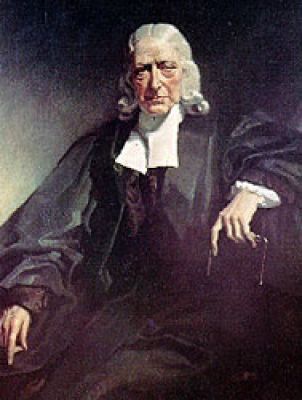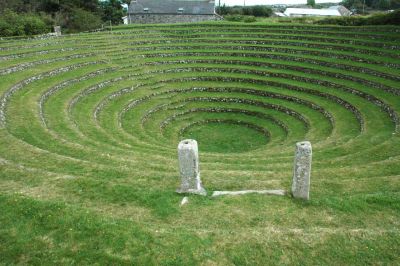John Wesley and the Methodist Movement
John Wesley (1703-1791) is widely credited with founding the Methodist Movement. Through it he promoted holiness of heart and life, calling it 'Christian Perfection'. Methodism gained momentum when John Wesley took to open-air preaching, persuading people that they could in this life reach a state where the love of God ruled their hearts. He was among the first to preach for the rights of slaves, and under his guidance Methodists became leaders in many other social justice issues of the day. John Wesley spent his life travelling extensively on horseback, helping to organise and form societies of Methodists throughout England, Scotland and Wales, small groups of Christians dedicated to developing intense personal accountability.
John Wesley first visited Cornwall in 1743 and proceeded to visit a further thirty two times before his death in 1791. On one of his very early visits, for which himself and two companions were forced to share just one horse, the gruelling six day journey from London was made even more difficult by heavy snow on Bodmin Moor. With no road yet built and fearing to get lost as night fell, Wesley sent his two companions ahead to look for refreshment. They arrived at Trewint Cottage, near Altarnun, and asked for food. The owner of the cottage, Digory Isbell, a stonemason, was out, but his wife Elizabeth offered them 'bread, butter and milk and good hay for the horse' and refused payment. To her amazement, before they left they knelt on the floor and 'prayed without a book.' A few weeks later they returned, this time with John Wesley himself, who had already achieved a modicum of fame. Three hundred neighbours came to hear him preach and Digory was inspired by a passage from the Bible to build an extension onto his house, for the use of John Wesley and his preachers whenever they came to Cornwall.
Cornwall took to Methodism like no other county in England and Trewint, which was restored and opened to the public in 1950 as Wesley Cottage, became the centre of a flourishing Methodist Society. Wesley's practice of preaching outdoors and in barns and cottages suited Cornwall's geography; the rural population was huge and many villages were isolated from the parish church. Huge crowds of up to twenty thousand people were drawn to open-air meetings in places such as Gwennap Pit, where Wesley preached eighteen times.
For a community of miners, facing danger at work every day, farmers and fishermen, threatened by creeping industrialisation, Wesley's simple doctrine of justification through faith and instant salvation offered comfort, security and hope. John Wesley also set up health and literacy facilities in order to help the impoverished improve their lot, thus making Methodism the religion of the people in contrast to Anglicanism, which had always been the preserve of the rich. Many charismatic Methodist lay preachers, such as Billy Bray, belonged to an emerging class of local mining captains and entrepeneurs, who helped to imbue the new faith with a welcome sense of social inclusion by speaking in the local dialect. Originally a movement designed to invigorate the Church of England from within, Methodism, certainly in Cornwall, began to drift apart from it.
By 1750 Methodist societies had been established in thirty of the mining communities in West Cornwall as well as four in North-East Cornwall. By 1798 the membership figures for the Redruth and St Austell societies were the fourth and seventh largest in the whole of Britain and contained at least five per cent of the country's Methodists. By 1851 Cornwall was the only county outside of North Wales where attendees at Methodist chapels were in the majority and by the mid nineteenth century Methodism in Cornwall had become so widespread that the vicar of Crowan was forced to admit that 'the religion of the mass is become Wesleyan Methodism'.
Other Methodists factions grew up alongside the Wesleyans, such as the Bible Christians and the Primitive Methodists. These gradually began to join with each other until, in 1932, the United Methodist Church was formed, to which most sects subsrcibed. Today, Methodism continues to flourish in Cornwall and out of the county's seven hundred surviving chapels, over eighty percent are Methodist.






